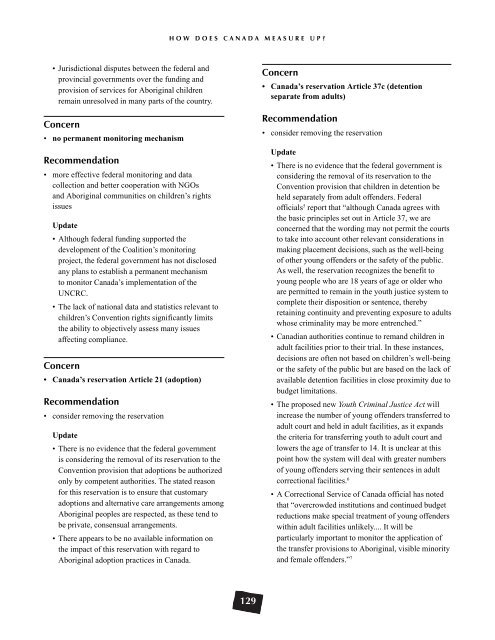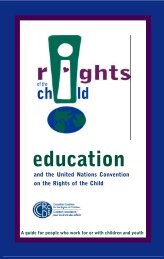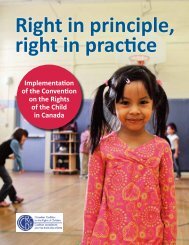Poste - Canadian Coalition for the Rights of Children
Poste - Canadian Coalition for the Rights of Children
Poste - Canadian Coalition for the Rights of Children
You also want an ePaper? Increase the reach of your titles
YUMPU automatically turns print PDFs into web optimized ePapers that Google loves.
• Jurisdictional disputes between <strong>the</strong> federal and<br />
provincial governments over <strong>the</strong> funding and<br />
provision <strong>of</strong> services <strong>for</strong> Aboriginal children<br />
remain unresolved in many parts <strong>of</strong> <strong>the</strong> country.<br />
Concern<br />
• no permanent monitoring mechanism<br />
Recommendation<br />
• more effective federal monitoring and data<br />
collection and better cooperation with NGOs<br />
and Aboriginal communities on children’s rights<br />
issues<br />
Update<br />
• Although federal funding supported <strong>the</strong><br />
development <strong>of</strong> <strong>the</strong> <strong>Coalition</strong>’s monitoring<br />
project, <strong>the</strong> federal government has not disclosed<br />
any plans to establish a permanent mechanism<br />
to monitor Canada’s implementation <strong>of</strong> <strong>the</strong><br />
UNCRC.<br />
• The lack <strong>of</strong> national data and statistics relevant to<br />
children’s Convention rights significantly limits<br />
<strong>the</strong> ability to objectively assess many issues<br />
affecting compliance.<br />
Concern<br />
• Canada’s reservation Article 21 (adoption)<br />
Recommendation<br />
• consider removing <strong>the</strong> reservation<br />
Update<br />
• There is no evidence that <strong>the</strong> federal government<br />
is considering <strong>the</strong> removal <strong>of</strong> its reservation to <strong>the</strong><br />
Convention provision that adoptions be authorized<br />
only by competent authorities. The stated reason<br />
<strong>for</strong> this reservation is to ensure that customary<br />
adoptions and alternative care arrangements among<br />
Aboriginal peoples are respected, as <strong>the</strong>se tend to<br />
be private, consensual arrangements.<br />
• There appears to be no available in<strong>for</strong>mation on<br />
<strong>the</strong> impact <strong>of</strong> this reservation with regard to<br />
Aboriginal adoption practices in Canada.<br />
H O W D O E S C A N A D A M E A S U R E U P ?<br />
129<br />
Concern<br />
• Canada’s reservation Article 37c (detention<br />
separate from adults)<br />
Recommendation<br />
• consider removing <strong>the</strong> reservation<br />
Update<br />
• There is no evidence that <strong>the</strong> federal government is<br />
considering <strong>the</strong> removal <strong>of</strong> its reservation to <strong>the</strong><br />
Convention provision that children in detention be<br />
held separately from adult <strong>of</strong>fenders. Federal<br />
<strong>of</strong>ficials5 report that “although Canada agrees with<br />
<strong>the</strong> basic principles set out in Article 37, we are<br />
concerned that <strong>the</strong> wording may not permit <strong>the</strong> courts<br />
to take into account o<strong>the</strong>r relevant considerations in<br />
making placement decisions, such as <strong>the</strong> well-being<br />
<strong>of</strong> o<strong>the</strong>r young <strong>of</strong>fenders or <strong>the</strong> safety <strong>of</strong> <strong>the</strong> public.<br />
As well, <strong>the</strong> reservation recognizes <strong>the</strong> benefit to<br />
young people who are 18 years <strong>of</strong> age or older who<br />
are permitted to remain in <strong>the</strong> youth justice system to<br />
complete <strong>the</strong>ir disposition or sentence, <strong>the</strong>reby<br />
retaining continuity and preventing exposure to adults<br />
whose criminality may be more entrenched.”<br />
• <strong>Canadian</strong> authorities continue to remand children in<br />
adult facilities prior to <strong>the</strong>ir trial. In <strong>the</strong>se instances,<br />
decisions are <strong>of</strong>ten not based on children’s well-being<br />
or <strong>the</strong> safety <strong>of</strong> <strong>the</strong> public but are based on <strong>the</strong> lack <strong>of</strong><br />
available detention facilities in close proximity due to<br />
budget limitations.<br />
• The proposed new Youth Criminal Justice Act will<br />
increase <strong>the</strong> number <strong>of</strong> young <strong>of</strong>fenders transferred to<br />
adult court and held in adult facilities, as it expands<br />
<strong>the</strong> criteria <strong>for</strong> transferring youth to adult court and<br />
lowers <strong>the</strong> age <strong>of</strong> transfer to 14. It is unclear at this<br />
point how <strong>the</strong> system will deal with greater numbers<br />
<strong>of</strong> young <strong>of</strong>fenders serving <strong>the</strong>ir sentences in adult<br />
correctional facilities. 6<br />
• A Correctional Service <strong>of</strong> Canada <strong>of</strong>ficial has noted<br />
that “overcrowded institutions and continued budget<br />
reductions make special treatment <strong>of</strong> young <strong>of</strong>fenders<br />
within adult facilities unlikely.... It will be<br />
particularly important to monitor <strong>the</strong> application <strong>of</strong><br />
<strong>the</strong> transfer provisions to Aboriginal, visible minority<br />
and female <strong>of</strong>fenders.” 7




